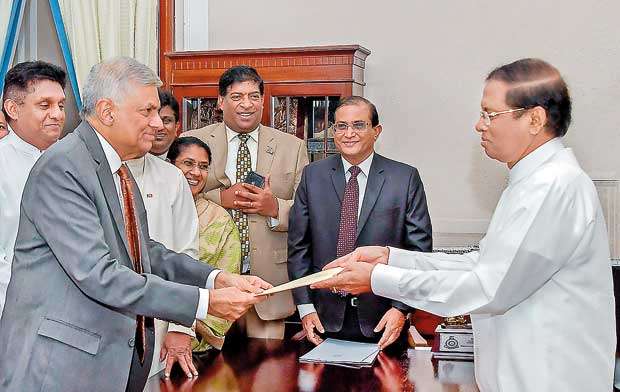Reply To:
Name - Reply Comment
Last Updated : 2024-04-24 14:12:00

 or forms of government, let fools contend; whatever is best administered is best, said Alexander Pope. The 18th century poet’s one-liner still rings true, in the context of ceaseless constitutional crises and ubiquitous debates over political reforms. No country is an exception. Even in Saudi Arabia, arguably the most rigid monarchy, political reform is a major demand of the dissidents. This was amply reported in news items on the recent killing of journalist and democracy activist Jamal Khashoggi.
or forms of government, let fools contend; whatever is best administered is best, said Alexander Pope. The 18th century poet’s one-liner still rings true, in the context of ceaseless constitutional crises and ubiquitous debates over political reforms. No country is an exception. Even in Saudi Arabia, arguably the most rigid monarchy, political reform is a major demand of the dissidents. This was amply reported in news items on the recent killing of journalist and democracy activist Jamal Khashoggi.
In the United States, the call for political reforms is widespread. Hundreds of resolutions are proposed every congressional term to amend the US Constitution. It is said that from 1789 till January 3, 2017, about 11,699 measures have been proposed to amend the US Constitution.
In the United Kingdom, too, political reforms are an ongoing process; more so, after the 1998 Good Friday Agreement in Northern Ireland. The nature of the union has undergone drastic change, with not only Northern Ireland, but also Scotland and Wales getting parliaments or assemblies of their own.
Although sacrosanct, constitutions should not be airtight. When the exigencies of the situation demand, constitutional changes need to be done. That is why constitution framers include provisions outlining the process to change or replace the constitution.
Going by the political undercurrents of the past 55 days, it appears that the crisis or the conflict President Maithripala Sirisena unleashed on October 26 is still not over. But it has rekindled the debate on the abolition of the executive presidency. Suddenly, there seems to be an urgent need to bring in more constitutional  provisions to check the president’s excesses. The irony is that the United National Party, which introduced the executive presidency through a new constitution in 1978, is now calling for its abolition, while the Sri Lanka Freedom Party has now become its main advocate though it earlier opposed the executive presidency on the basis that it would undermine the democratic structure of Sri Lanka’s post-independence government.
provisions to check the president’s excesses. The irony is that the United National Party, which introduced the executive presidency through a new constitution in 1978, is now calling for its abolition, while the Sri Lanka Freedom Party has now become its main advocate though it earlier opposed the executive presidency on the basis that it would undermine the democratic structure of Sri Lanka’s post-independence government.
Against the backdrop of the Supreme Court’s December 13 ruling that the Executive President had acted illegally and violated the constitution, lawmakers in parliament this week argued in favour of and against the executive presidency. Government and Janatha Vimukthi Peramuna MPs urged that the executive presidency should be abolished, given the temptation of the Presidents to resort to undemocratic and unconstitutional measures. United People’s Freedom Alliance (UPFA) MPs insisted that it should be retained at least with enhanced checks and balances to ensure the territorial integrity of the country.
" Thanks to the 19th Amendment, Prime Minister Wickremesinghe could withstand the presidential salvos against all odds, and defeat the constitutional coup"
The need of the hour, however, is to eliminate backdoor avenues and plug loopholes to avert constitutional dictatorship, the types of which was seen during the 52-day crisis created by President Sirisena -- and also during the presidency of Mahinda Rajapaksa, who, by introducing the 18th Amendment, suffocated the democratic spirit of the constitution. Sadly, the war-winning President Rajapaksa, who built his political career by promoting himself as a defender of human rights, especially during the 1988-89 era of terror, is now known the world over as a ‘strongman’ – certainly not a flattering description. It is a term used by political analysts to describe a military or political figure who exercises far more influence over the government than the constitution permits. World history may not be kind to Sirisena and Rajapaksa. It will not enshrine their names as defenders of democracy, if they continue to be adamant in not seeing the virtues of democracy.
Prior to the adoption of the 1978 constitution, many a warning was sounded about the threats it could pose to democracy. A seasoned politician of yesteryear rightly said that he dreaded to think the consequences if a mentally unbalanced person became the President and was to enjoy the virtually unlimited and unchecked powers associated with the office.
The power the executive presidents wield is a trust the people place in them in terms of a social contract. But Sri Lanka’s executive presidents, from J.R. Jayewardene to Maithripala Sirisena, perhaps the only exception being D.B. Wijetunga, have abused that power, so much so that every succeeding president became a bigger tyrant than his or her predecessor. The problem is not over whether a constitution is good or bad, but whether the politicians who wield the power are good or bad. As this column has said before, a constitution, however good it is, can be bad in the hands of a bad leader, while a constitution, however bad it is, can be good in the hands of a good leader.
Sri Lanka’s 40-year tryst with the executive presidency, especially in the context of the current political crisis, is not a pleasant experience. Either it should be abolished or more checks and balances need to be introduced, so that there will be stability even when a cohabitation government is in power. The JVP’s proposed 20th Amendment is indeed a step in the right direction.
Sri Lanka’s experiment with cohabitation governments paints a dismal picture. The fact that cohabitation governments have miserably failed is proof enough that our leaders are power-hungry. Rather than coming together for the benefit of the people and the country, our politicians are interested in enhancing their political power – and for this purpose, they have no qualms about abusing the constitutional powers and taking cover behind warped interpretations of the constitution.
Sri Lanka’s constitution is neither exclusively presidential, nor purely Westminster. It is a hybrid system which can, at times, bring about a cohabitation government.
Political cohabitation is a form of governmental arrangement between the executive president and a rival party prime minister.
"Suddenly, there seems to be an urgent need to bring in more constitutional provisions to check the president’s excesses"
In the absence of clear-cut constitutional provisions, cohabitation governments are usually associated with political backstabbing. In Sri Lanka, this was first witnessed in 2001, when Prime Minister Ranil Wickremesinghe’s UNP-controlled Parliament was dissolved by President Chandrika Kumaratunga before parliament completed its six-year term, though she had promised she would not do so as long as the UNP had the majority in Parliament. It happened again on October 26 this year, and we all know the political turmoil came after that. Thanks to the 19th Amendment, Prime Minister Wickremesinghe could withstand the presidential salvos against all odds, and defeat the constitutional coup. But the battle, it appears, is not yet over.
In recent decades, this country has seen disaster after disaster, natural and man-made, economic and political. On top of these problems, the political crisis the President has created has dealt a devastating blow to the economy. We do not need any more disasters. What we urgently need is development that will free us from the shackles of poverty and provide jobs for our youths. For this, we need to ensure political stability. Under the present constitution, cohabitation governments have proved a failure and cannot ensure that political stability. The 1978 constitution has not delivered political stability, though it was drafted and adopted for that purpose. We need to go for a new constitution that will make prime minister the head of government and the president, who will be appointed by Parliament or an electoral college, the head of state – like in India and Pakistan. We need a constitution that will promote development and that will contain provisions to solve the country’s ethnic issue through meaningful devolution of power.
Dr Raj Friday, 21 December 2018 02:30 PM
An impressive article that sums our past and shows a way forward.

Add comment
Comments will be edited (grammar, spelling and slang) and authorized at the discretion of Daily Mirror online. The website also has the right not to publish selected comments.
Reply To:
Name - Reply Comment
US authorities are currently reviewing the manifest of every cargo aboard MV
On March 26, a couple arriving from Thailand was arrested with 88 live animal
According to villagers from Naula-Moragolla out of 105 families 80 can afford
Is the situation in Sri Lanka so grim that locals harbour hope that they coul